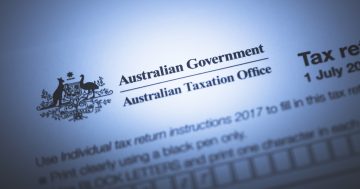
Human Rights Law Centre senior lawyer Kieran Pender says whistleblower protection laws must be strengthened. Photo: Canberra Writers Festival.
The Human Rights Law Centre wants a complete reworking of public sector whistleblower protection, saying it is a human right to express opinions that expose wrongdoing and abuses.
In its recent submission to the Federal Attorney-General’s Department, the centre has called for an overhaul of the Public Interest Disclosure Act, the federal law protecting public servant whistleblowers.
The HRLC also wants a whistleblower protection authority to improve transparency and accountability in Australia’s democracy.
“Whistleblower protection is an essential part of the wider human rights framework in this country, underpinned by Australia’s international obligations,” its submission says.
“The ability of whistleblowers to speak up, and the public’s right to know, is protected under the right to freedom of opinion and expression in international human rights law.
“In recent decades whistleblowers have proven critical to exposing human rights abuses around the world – without robust whistleblowers protections and public interest journalism, too often human rights violations go unchecked.
“Whistleblower protections have emerged as an important aspect of the obligations of state parties, including Australia, to fight corruption under the United Nations Convention against Corruption.
“Whistleblowers also play an important role in upholding Australia’s transparent, accountable democracy, ensuring governments respect and uphold human rights and build a fairer, more compassionate country.”
Describing whistleblowers as “brave people who expose wrongdoing to hold institutions accountable and prevent wrongdoing”, the centre insists comprehensive law reform is needed for proper whistleblower protection.
Its submission aims to underscore how it sees the PID Act failing to protect whistleblowers and why there is a need for urgent amendments.
“Australia’s federal whistleblower protection framework requires urgent reform,” the submission states.
“Not only is it presently failing to effectively protect whistleblowers who disclose wrongdoing or misconduct in the public interest, but the scheme’s inadequacies are exacerbating the risks faced by whistleblowers.
“The PID Act is failing to prevent the reprisals and prosecutions which in turn are having a ‘chilling effect’ on whistleblowing in Australia. That must change.”
Attorney-General Mark Dreyfus is considering further legislative reform.
In June last year, the Federal Parliament passed priority amendments to the PID Act, which ensured immediate improvements to the public sector whistleblower scheme were in place in time for the start of the National Anti-Corruption Commission.
The government then launched a second consultation stage on further support for public sector whistleblowers, including considering a whistleblower protection authority or commissioner.
Mr Dreyfus has noted the numerous reports and reviews into whistleblowing protection laws the government is considering.
“The government will closely examine the responses to these consultations to determine what reforms are required to ensure Australia has an effective and accessible framework,” he said.
The HRLC says such consideration comes at a critical juncture for transparency and integrity in Australia, particularly following the recent establishment of the NACC.
Senior lawyer at the HRLC, Kieran Pender, has urged the Attorney-General to be bold in introducing reforms.
“Australia’s democracy should protect and empower people for standing up and exposing wrongdoing, but instead, Australia’s inadequate whistleblowing laws see whistleblowers suffer significant reprisals for telling the truth,” Mr Pender said.
“The Attorney-General Mark Dreyfus KC should overhaul Australia’s whistleblowing laws and establish a whistleblower protection authority to ensure that whistleblowers are protected, not punished and prosecuted.
“Until these laws are fixed, secrecy and wrongdoing will continue to thrive in Australia.”
A statutory review of Australia’s private sector whistleblowing law is due this year.
Last year, the Attorney-General’s Department reviewed Australia’s secrecy laws, with legislative change pending, while a further review of secrecy offences by the Independent National Security Legislation Monitor will begin shortly.
Original Article published by Chris Johnson on Riotact.











